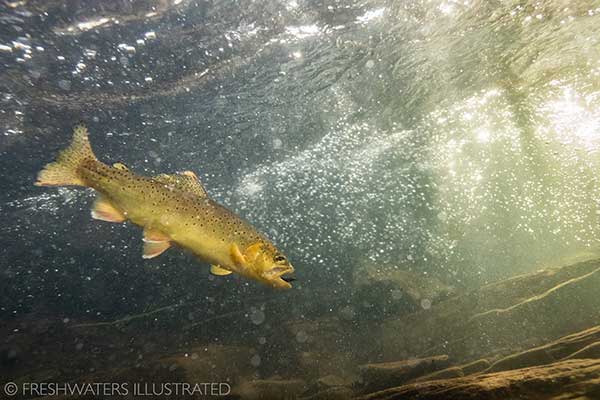50 years of collaborative conservation credited with gains for the Apache trout
Pinetop, AZ – The U.S. Fish and Wildlife Service is proposing to remove the native Arizona Apache trout from the List of Endangered and Threatened Species. Collaboration and partner-driven habitat conservation, non-native trout removal, and reintroduction efforts helped save the Apache trout from the brink of extinction. If delisted, it would be the first gamefish to be removed from the list of threatened and endangered species.
“The Apache trout’s recovery is a significant conservation milestone and a remarkable story to celebrate, especially now during the 50th anniversary of the Endangered Species Act,” said Amy Lueders, Fish and Wildlife Service Regional Director. “The ESA makes a difference by bringing people together to find solutions to conserve and recover imperiled species like the Apache trout.”
Arizona’s state fish, the Apache trout is native exclusively to the streams in and around the White Mountains in the eastern part of the state. It was originally considered the same species as the Gila trout, which was listed under the Endangered Species Preservation Act in 1967. Apache trout was first described as a unique species separate from the Gila trout in 1972. A year later, it gained protection under the Endangered Species Act of 1973 and was subsequently downlisted to threatened in 1975.
A major threat to Apache trout populations has been the introduction of non-native trout. The gene pool was threatened by hybridization with non-native rainbow and cutthroat trout. Additionally, non-native brook and brown trout pose threats through competition and predation. Much of the collaborative conservation work has involved removing these introduced trout from the Apache trout habitat and constructing barriers to block further non-native invasions.
With additional conservation efforts led by the White Mountain Apache Tribe in collaboration with the U.S. Forest Service, Arizona Game and Fish Department, and Trout Unlimited, Apache trout populations are rebounding. Removing outdated fish passage barriers will reconnect fragmented habitat and Apache trout populations, increasing genetic diversity. Projects funded through the Bipartisan Infrastructure Law, such as the 2022 Apache Trout Recovery Fish Passage Infrastructure Project and the 2023 Crooked Creek Route 55 Culvert Fish Passage Project, both led by the White Mountain Apache Tribe, are supporting the recovery of Apache trout by replacing culverts, removing barriers and creating larger meta-populations of Apache Trout by re-opening access to over 60 miles of habitat.
The delisting proposal was preceded by a 5-year review and 2021 species status assessment, which included the best available scientific information. The assessment evaluated the species’ current needs, condition, and threats, in addition to modeling future scenarios. The most recent 5-year review, published Aug. 23, 2022, recommended delisting this species due to recovery. More information about 5-year status reviews is available on the Service’s website.
If the Apache trout is delisted, active management to maintain conservation barriers and limit hybridization with non-native trout species will continue. In addition, the ESA requires the Service to implement a post-delisting monitoring plan for a minimum of five years to ensure the species remains stable.
Today’s announcement comes as the ESA turns 50 years old in 2023. Throughout the year, the Department of the Interior will celebrate the ESA’s importance in preventing imperiled species extinction, promoting wildlife recovery, and conserving the habitats they depend on. The ESA has been highly effective and credited with saving 99% of listed species from extinction. Thus far, more than 100 species of plants and animals have been delisted based on recovery or reclassified from endangered to threatened based on improved conservation status, and hundreds more species are stable or improving thanks to the collaborative actions of Tribes, federal agencies, state and local governments, conservation organizations and private citizens.
Comments on the proposed delisting must be received within 60 days of its publication in the Federal Register. Information on how to submit comments is available at www.regulations.gov by searching under docket number FWS-R2-ES-2022-0115. Information on how to request a hearing is also included in the Federal Register notice.
Find answers to frequently asked questions on this proposal here.
To learn more about the Apache trout, please visit the species profile page.
The U.S. Fish and Wildlife Service works with others to conserve, protect, and enhance fish, wildlife, plants, and their habitats for the continuing benefit of the American people. For more information, visit www.fws.gov, or connect with us through any of these social media channels: Facebook, Twitter, Instagram, LinkedIn, Flickr, and YouTube.









